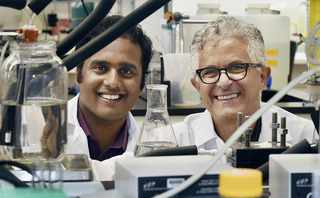Philsang Yoo heard a patter of footsteps behind him, turned away from a blackboard cluttered with mathematical formulae, and saw that three more students had entered the lecture room. His eyes widened. “I didn't expect so many,” he said, chuckling uneasily. By now about thirty people had crowded inside, and several of them seemed to be compulsively counting and recounting themselves, unable to believe that so many Yale students would want to attend a public lecture on “Quantum Field Theory for Math Majors.” Yoo is a professor of mathematics; in front of him there were mathematics majors, physics majors, students who had taken Directed Studies, two amateur poets, a journalist, a gray-bearded professor who intermittently pulled out an inhaler, and, sitting quietly in the back row, a junior with blue eyes and hair the color of sunburnt hay who would, in a few days, be flying back to Oxford to study mathematics far away from Yale.
Connor Halleck-Dube '19 is the sort of student that Yale has been eager to attract for decades. He's someone who knew something about general relativity before stepping foot on campus, who was comfortable with proof-based mathematics before the first lecture of Math 230. There are many reasons he decided to study abroad in his junior year, one of which was the sparsity of Yale's offerings in abstract algebra.
“Why don't we have a class in homological algebra?” he later asked me over dinner in an incredulous tone. “That's really important for anyone who studies anything in algebra.” Oxford does have an undergraduate course in homological algebra, along with a mathematics faculty who, in Connor's opinion, commit far more attention to teaching undergraduates than the faculty of Yale.
Read Full Article »



